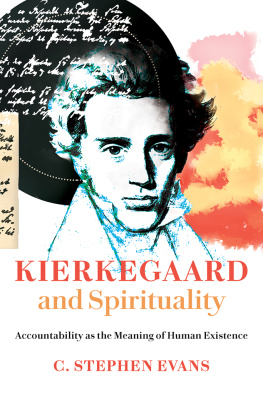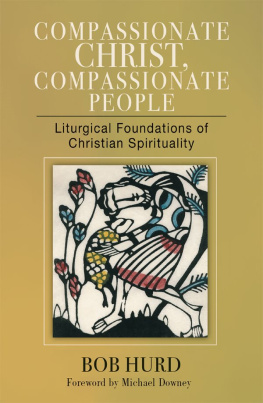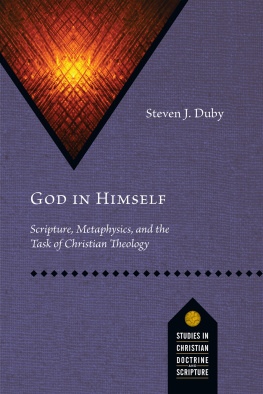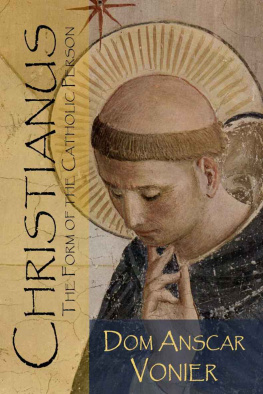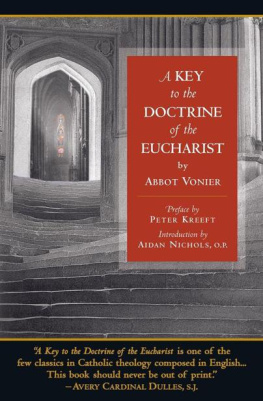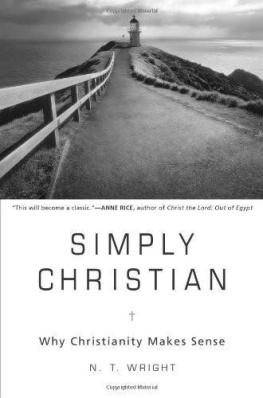THE CHRISTIAN
MIND
BY
DOM ANSCAR VONIER, O.S.B.
ABBOT OF BUCKFAST

2013
Nihil Obstat.
F. Thos. Bergh, Censor Deputatus.
Imprimatur.
Edm . Can. Surmont, Vic. Gen .
Westminster
May 2, 1918.
The Nihil Obstat and Imprimatur are official declarations that a book or pamphlet is free of doctrinal or moral error. No implication is contained therein that those who have granted the Nihil Obstat and the Imprimatur agree with the content, opinions or statements expressed.
This book was originally published in 1920 by B. Herder.
Copyright 2013 Assumption Press. All rights reserved
Cover image: St. Paul Writing his Epistles , by Valentin du Boulogne, 1618-20
Foreword
It is the experience of every observer how reluctant Christian men and women are to embrace bravely and ungrudgingly with their mind the practical conclusions that flow from the great mystery of the Incarnation. Ever so many Christians, even amongst those who profess piety, and possess education, shape their thoughts, and order their lives, on principles that have no direct relationship with the central fact of Christianity, the Incarnate Son of God.
I have tried in the following pages to draw a distinction between general spirituality, and the specific Christian spirituality, which is based on the practical assimilation by our minds of the doctrine of the Incarnation. The purpose of the book is, of course, more of the nature of a philosophy of the Christian religion, than of a hortatory, or preceptive character.
It is a modest contribution to that effort of which there are so many instances in Western Christendom in our days, of building up a Christian mind, as a power of thought that rules in virtue of its own innate truthfulness and excellency.
In the building of a great fane even the one that carries the hod feels that he is doing a great work.
My book might easily be compared with the labors of the carrier of the hod, even by a kind critic, as there is such an accumulation of scriptural texts through these pages. There seems little art required to string together quotations from Holy Writ. I must submit completely to this judgment, with the assurance however that the kind of result I aim at could not be obtained otherwise. To each man his task, be it mean or noble, in rearing up the most glorious of all spiritual buildings, the Christian Mind.
Buckfast Abbey, Easter 1918.
ANSCAR VONIER, O. S. B., Abbot.
I
Christian Theology and
the Christian Mind
The doctrines concerning Christ s sacred Person stand out before the Christian intellect as a clearly defined and full grown body of dogmas. This body of dogmas has reached maturity long ago, and unlike mans bodily frame, it keeps its freshness and health and vigor and youthfulness unimpaired as the world grows older.
The doctrines respecting Christ s Person are commonly designated under the term Christology. It may be said that Christology as a series of doctrines reached its perfection at the end of the eighth century of the Christian era. By that time the universal councils of the Church had made it clear, for all times, what are the true elements that enter into the composition of that wonderful Personality, Jesus Christ.
Later councils, as, for instance, the council of Trent, have defined many doctrines concerning Christ s share in the work of mans salvation, but they did not add anything to our knowledge of the mystery of Christs Person, considered in Himself. The great Doctors of the Church, and foremost amongst them St. Augustine of Hippo and St. Thomas Aquinas, have made it their task to explain to the thinking Christian intellect the meaning and the far reaching bearing of the great Church definitions in this matter of the God Incarnate. Taken together with the pronouncements of the Church, the explanations furnished by the great divines in their theological treatises form a body of thought of the supremest intellectual order, independently of their value as Christian dogmas.
The doctrines of Christology are truths of the highest order, and no intellect could busy itself with them without reaching a high mental perfection, besides having the merit of the obedience of faith. The God Incarnate, however, is essentially and intrinsically the life of individual souls. It is His most constant and solemn assertion that He is life, man s life.
The life of the Christian therefore has a function that is all its own, namely to express and translate into actuality Christ, the Son of God; for the Son of God could not be man s life, unless mans life had it for one of its organic functions to give expression to the Son of God.
To be the Son of God, and to be the life of man, is the most adequate definition of Our Lord s role. Christology, or the theology of the Incarnation, is primarily concerned with the wondrous fact that Christ is the Son of God. It is chiefly theoretical in nature. As I said a moment ago, it is a marvelous system of doctrines that has reached maturity, and I might say, finality, long ago.
But Christ s other role, that of being the life of man, is still to a great extent an unexplored field of immense spiritual possibilities, at least for individual souls. It is simply impossible to tell to what extent individual souls may find Christ to be their life. The past exhibits some very glorious patterns of Christ as the life of man. The future may have in store other and no less surprising manifestations of the same life.
When I say here that Christ s role as the life of man is an unexplored field of spiritual possibilities, I owe my reader a word of explanation. There are, of course, the clearly defined doctrines of the influence and action of mankinds Redeemer on mankind.
The Church has pronounced on all matters that are pertinent to the general question of man s salvation and sanctification through Christ. Such doctrines are really part of our general Christology: they share its maturity and its finality. But when all doctrines concerning our Lord, both in Himself and in His action on souls, have been enumerated, there still remains another realm of supernatural realities that invites exploration.
The question is this: how does a man behave, to whom the Incarnation and all that it implies has become a living fact, and in whom the Son of God is an actual and pulsating life? How does such a man feel, how does he act, what does he dare, what view does he take of man in life and death? What sort of mind has he, what sort of heart, what sort of character?
And more generally, how far is the Incarnation capable of producing a specific character, a specific mind, in the people who believe it all literally, without any reservations? Is there, or can there be, here on earth, a race of men and women whose characters, whose minds, are not only modified, but are actually created by sincere and living belief in the Son of God, so that a great dramatist could place them in some heroic play, as he could be quite certain of the workings of such characters?
In one word, putting it more learnedly: is there, or can there be, a psychology of the Incarnation in men and women as truly as there is the psychology of nationality and race and heredity and environment, and what are the elements of such a psychology?
Put in this wise, the matter becomes clearly distinguished from the more generic question as to Christs share in mans redemption. It is distinction between principles and character. The great truths of Catholic Christology are the principles. What we are trying to find out now, is the sort of character such principles are able to produce, and do produce in reality.
Next page

